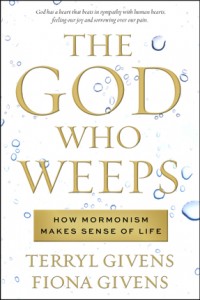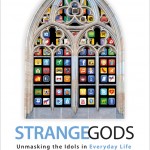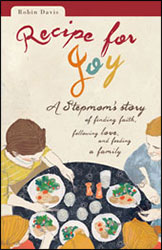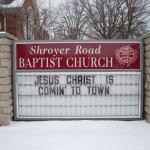The God Who Weeps: How Mormonism Makes Sense of Life
by Terryl Givens and Fiona Givens
Ensign Peak, 2012
Can God make a rock so heavy He can’t pick it up? That’s the playground version of the questions raised by the apparent paradox an omnipotent Deity presents to the limited human mind.
When you get older, and life drops the heavy boulders of sin and suffering and death into your path, the questions get more complicated. Why do the innocent suffer while the guilty go unpunished? Why, in this world, do our best efforts to live good and true and meaningful lives gang aft agley? If God is both all-good and all-powerful, why does evil exist?
It’s the kind of theological Rubik’s Cube that atheists are delighted to dispense with. Believers, however, have been wrestling with the puzzle from the very beginning, long before the author of Job transformed an old folk tale into a brilliant courtroom drama in which God is not only dragged into the dock as the accused, but also defends himself by tossing the case out of court as a nuisance suit.
Job’s case was apparently dismissed without prejudice, however, as various faith traditions continue to attempt to reconcile the notion of an omnipotent, benevolent God with the lived experience of human suffering. It’s called theodicy (pronounced in such a way that I can never resist making puns about theiliad), this process of “making sense of life,” as Terryl and Fiona Givens refer to it in the subtitle of The God Who Weeps.
Catholicism, like most mainstream Christian traditions, locates the answer to the problem of evil in human brokenness and sin, the reverberating consequences of the Fall. Judaism, while stopping short of interpreting Genesis as depicting original sin in the way Christianity has since Augustine, also acknowledges the role of evil inclination in the human heart—the “stiff-necked” pride that resists submission to God’s will, personified in Satan, “the accuser.” Islam, so far as I understand it, concurs. Other traditions have their own answers: gods who are in themselves flawed, if less so than humans; a world whose sorrows are merely illusions.
 I didn’t, before reading The God Who Weeps, have much of an idea about how Mormons answer the question of evil. So I was surprised to find, as I read, so much that struck me as familiar. The deja-vu came not from my Catholicism—though the book is studded with supporting quotations from Catholic and other Christian writers through the centuries—but from the years I spent as a Gnostic. True, there are key differences between Mormonism and the Valentinian Gnostic or Cathar traditions (significantly, Mormons hold that all existence is material, and that matter is perfectible), but like these best-known Gnostic philosophies Mormonism holds that God, as we understand God, is neither omnipotent nor uncreated.
I didn’t, before reading The God Who Weeps, have much of an idea about how Mormons answer the question of evil. So I was surprised to find, as I read, so much that struck me as familiar. The deja-vu came not from my Catholicism—though the book is studded with supporting quotations from Catholic and other Christian writers through the centuries—but from the years I spent as a Gnostic. True, there are key differences between Mormonism and the Valentinian Gnostic or Cathar traditions (significantly, Mormons hold that all existence is material, and that matter is perfectible), but like these best-known Gnostic philosophies Mormonism holds that God, as we understand God, is neither omnipotent nor uncreated.
According to the Givenses, who make a popular case for the way Mormonism—with its ever-open canon and unlimited doctrinal flexibility to evolve—speaks of God today, God is vulnerable, his power limited by the freedom of human will. (I’m indebted to James Faulconer’s article “The Mormon Understanding of Persons . . . and God” for background into the ways Mormon teaching has developed.) God is not capable of bestowing salvation on those who reject it; that’s a boulder too heavy for Him to pick up.
God cannot arbitrarily dispense a blanket “salvation” on the human race . . . . Even if it were possible, imposing a heavenly reward on those who choose heaven would be just that: an imposition on the “unwilling” and an abrogation of the moral agency on which all human life and earthly existence is predicated. (pp. 88,89)
That primacy of moral agency also disallows a Creator God to whose will humans are subject.
One can say, God created us and He created us free. But that just substitutes a declaration for an explanation. No, if God is the sole author of all that is, then we cannot find our way clear to believe that He is not responsible for our choices. (p. 48)
The way Mormonism makes sense of life, Givens and Givens explain, is to place humanity on a level playing field with God. We are, they say, all immortal and uncreated beings, all gods. We choose to become vulnerable to experience, as God has, because that is how we grow into full knowledge (gnosis–parenthetical note mine) of who we are. And that utterly free choice—the choice made before time and merely, in Mormon thought, retold in the story of the garden of Eden—exposes us to the suffering by which we are purified, refined, tried and molded into what we have always been and will always be, sharers in the immortal joy of a benevolent God made in our glorified image.
Co-participation in the decision to embark on a mortal sojourn does not eliminate the problem of evil, but it dramatically alters it. If we were involved in the deliberations that culminated in creating and peopling this world, then we are not passive victims of providence. . . . Such co-participation does not mitigate the horror of what many experience in this life. . . . But the suspicion that we were party to the terms of our own predicament may give heart when no other solace is to be found. (pp. 52,53)
In fact, in this view, bad things happen to good people precisely because they are good people (er, immortal beings), who had the humility to choose the rickety escalator to full godhead rather than letting a soft life carry them slowly up the ladder.
If we chose our lot in life, there is every reason to suspect merit, and not disfavor, is behind disadvantaged birth. (p. 61)
For those less meritorious, or those who insist on turning away from the lessons of experience, Mormonism holds the ultimate promise. There is no eternal damnation, because any immortal being foolish enough to think he or she chose that during this life, or who had too easy a journey to learn much, will have an eternity of make-up classes after death. There’s no judgment in Mormonism, just an infinity of chances to grow at your own pace.
This last explains ancestry.com, by the way, and the Mormon practice that’s sometimes known as retroactive baptism of the dead. It’s not grandfathering proselytism, but more like a very detailed form of praying for the faithful departed. The more one knows about one’s ancestors, the better able one is to have sufficiently detailed post-mortem obsequies performed to speed the immortal being who once was Great-Uncle Harry on to attaining its full potential.
This combination of a Gnostic approach to theodicy and the ultimate in good ol’ American self-making (see Leah Libresco’s review) is what led Harold Bloom to cause such a kerfuffle, some years ago, by calling Mormons the true American Gnostics. (Bloom meant that as a compliment.) There’s certainly a case to be made that Joseph Smith came to his revelations in a time and place rife with emergent American spiritualities, in the “burned-over district” of upstate New York where the fire-and-brimstone tent revivalism of the Second Great Awakening ran head-on into powerful currents of budding theosophy, transcendentalism, and spiritualism. The God Who Weeps makes an effective case for choosing the latter over the former as an answer to the problem of evil. For Catholics, who never succumbed to the horrors of predestination and so were spared being held dangling like loathsome spiders over the flaming pit along with the sinners in the hands of Jonathan Edwards’ angry God, the choice was never that simple, and a definitive answer to the problem of evil never as necessary. We are content to live with mystery, in Mystery.
Many of The God Who Weep‘s most persuasive proof quotes are drawn from the writings of the 17th-century Cambridge Platonist Henry More, whose work was highly influential on modern Gnostic philosophies, from the Romantic poets, and from Mormon scriptures, which are presented as canonical. A big quibble I have with the book in general: Givens and Givens present most quotations without attribution or footnoting; one has to search the unpaged end notes diligently to identify sources. Mormon teachings are referred to in the text as “contemporary revelations,” and mainstream Jewish and Christian writers (more likely to be mystics, poets, or preachers than theologians) are cherry-picked for quotes that support Mormon theodicy. A note on sources does for proof texts what retroactive baptism does for deceased non-Mormons: it makes everything canonically Mormon.
Mormons believe that whatever God’s servants “speak when moved upon by the Holy Ghost shall be scripture” (D&C [Mormon Doctrine & Covenants, a compilation of Joseph Smith’s writings and revelations] 68:4). Accepting that more liberal sense of inspired writings, we have culled our sources from a wider tradition that includes Classical, Jewish, Catholic, and Protestant texts. (p. 125)
One quotation I was expecting, in a book that relies on John Keats for its thesis statement, was mysteriously missing. Perhaps that’s because it comes from a letter (the same letter from which the Givenses derive their description of the condition of humanity as “straining at particles of light in the midst of great darkness”) in which Keats sets out, in a few eloquent lines, the premise of The God Who Weeps, and anticipates an outline of Mormon theodicy.
The common cognomen of this world among the misguided and superstitious is ‘a vale of tears’ from which we are to be redeemed by a certain arbitrary interposition of God and taken to Heaven-What a little circumscribed straightened notion! Call the world if you Please “The vale of Soul-making”. Then you will find out the use of the world . . . I say ‘Soul making’ Soul as distinguished from an Intelligence- There may be intelligences or sparks of the divinity in millions-but they are not Souls till they acquire identities, till each one is personally itself. I[n]telligences are atoms of perception-they know and they see and they are pure, in short they are God-How then are Souls to be made? How then arc these sparks which are God to have identity given them-so as ever to possess a bliss peculiar to each one’s individual existence? I- low, but by the medium of a world like this? . . . I will put it in the most homely form possible-I will call the world a School instituted for the purpose of teaching little children to read-I will call the human heart the horn Book used in that School-and I will call the Child able to -read, the Soul made from that School and its hornbook. Do you not see how necessary a World of Pains and troubles is to school an Intelligence and make it a Soul? A Place where the heart must feel and suffer in a thousand diverse ways! Not merely is the Heart a Hornbook, It is the Minds Bible, it is the Minds experience, it is the teat from which the Mind or intelligence sucks its identity. As various as the Lives of Men are-so various become their Souls, and thus does God make individual beings, Souls, Identical Souls of the Sparks of his own essence-This appears to me a faint sketch of a system of Salvation which does not affront our reason and humanity. (John Keats, Letter to George and Georgiana Keats, Sunday 14 Feb.-Monday 3 May 1819 [spelling original])
It’s an answer that compels. It compelled me, for some years, and Terryl Givens and Fiona Givens have done a good job of presenting it. Having come back around from Gnosticism to Catholicism, though, it’s not an answer I can buy, or need. In this Year of Faith, it’s not even a question we’re asking much. This world is not either/or, but both/and—a vale of tears, a vale of soul-making. And as for God, all I know is what Job knew on his dunghill. He’s God, and I—most definitely—am not.
_____
Visit the Patheos Book Club to learn more about The God Who Weeps and its authors, and to join the discussion.












